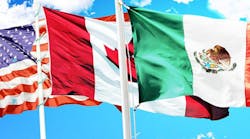Supply chain industry executives are split sharply about how Mexico will fare if it is able to agree with the United States and Canada on terms to update the North American Free Trade Agreement.
Executives in a new survey, “2018 Agility Emerging Markets Logistics Index”, are divided about whether a new pact would help Mexico (24.3%); hurt Mexico (21.8%); or leave trade unchanged (25.7%).
The survey of more than 500 global logistics executives is part of the 2018 Agility Emerging Markets Logistics Index, an annual snapshot of industry sentiment and ranking of the world’s 50 leading emerging markets by size, infrastructure, transport connections and business climate.
The Index, in its ninth year, ranks 50 emerging markets countries by factors that make them attractive to logistics providers, freight forwarders, shipping lines, air cargo carriers and distributors.
In the 50 country rankings, Brazil slips two spots to No. 9, falling below No. 8 Mexico even though the Brazilian economy is roughly 70% larger.
Emerging markets growth prospects look brighter than they have in years to logistics industry executives, who say small and medium-sized companies are the most likely to benefit from fresh acceleration of those economies.
In Agility’s annual survey of more than 500 supply chain industry professionals, nearly two-thirds agree with the International Monetary Fund’s 2018 emerging markets forecast of 4.8%-4.9% GDP growth. That would mark the fastest expansion for emerging markets since 2013 and a second consecutive year of higher growth for developing economies, which have slowed dramatically since a 7.4% GDP gain in 2010.
“Emerging markets enjoyed favorable market conditions in 2017 with trade growth the healthiest in years,” said John Manners-Bell, Chief Executive of Ti, which compiled the index. “However, there are many storylines yet to fully unfold, such as China’s debt, the renegotiation of NAFTA and ongoing political and economic transition in the Middle East. While the going looks good for now, there are numerous challenges on the horizon.”
2018 Index and Survey Highlights
--China and India top the 2018 rankings and put more distance between themselves and No. 3 UAE in the Index, a broad gauge of emerging markets’ competitiveness. Russia climbs three spots to No. 7, an indication its economy is stabilizing after years of low energy prices, capital flight and U.S. economic sanctions.
--Venezuela slumps four spots to No. 48, and ranks dead last in Market Size and Growth Attractiveness. Uruguay rises three places to No. 25, second largest increase after Egypt, which climbs six spots.
--Among other Latin countries, Peru is the biggest mover, climbing three spots to No. 27. Chile (12); Colombia (26); Argentina (28); Ecuador (34); Bolivia (37); Paraguay (40) were little changed.
--Qatar improves its overall Index ranking one spot to No. 11 despite an ongoing political dispute with a few countries in the Middle East. Qatar jumps two spots to No. 8 in the infrastructure/transport category and maintains its grip on No. 2 for business conditions. It leaps past Chile to rank as the No. 2 emerging market for countries with less than $300 billion annual GDP. Malaysia remained the leader for smaller emerging markets.
--Nigeria, Africa’s largest economy, tumbled to No. 31 from No. 24 a year ago. In spite of its potential, Nigeria ranks next-to-last in infrastructure and transport connections, or Market Connectedness, and 46th in business climate. Also falling: Kazakhstan fell six places despite a resumption in economic growth and announcement of a long-term development blueprint.
--Logistics executives are unconcerned, for now, that emerging markets economies will be harmed by Brexit, the UK’s departure from the European Union. Nearly 45% say emerging markets will be unaffected; 25.4% say emerging markets could gain from Brexit through expanded market access. A year ago, nearly 69% expressed concern that Brexit and the failure of various trade initiatives were a threat to trade.
--Gulf countries continue to dominate the top of the rankings when it comes to be emerging markets business conditions. UAE, Qatar, Oman and Bahrain outpaced all other countries. Saudi Arabia was No. 8; Kuwait was No. 16. Gulf countries also rank toward the top in quality of infrastructure and transport connections: UAE (1), Bahrain (5), Oman (6), Saudi Arabia (7) and Qatar (8) were top performers.
--Fifty-five percent of executives surveyed say small and medium-sized businesses – those with fewer than 250 employees – will benefit most from emerging markets growth. Twenty-six percent said large companies would be the biggest beneficiaries.
--India and China are the logistics industry’s favorite investment destinations, but Vietnam leads a second group that includes UAE, Brazil and Indonesia.
Cheap labor is losing its attraction as a driver of emerging markets growth in the eyes of logistics professionals. They rate economic growth, foreign investment, trade volumes, location and transport infrastructure as more important factors.
--The countries improving their infrastructure and transport connections most were India, Indonesia, Turkey, Egypt, Iran, Pakistan, Argentina and Bangladesh. Infrastructure and transport rankings fell for Kazakhstan, Sri Lanka, Colombia, Brazil, Thailand and Kuwait.
--In Sub-Saharan Africa, infrastructure, links between economic centers and poor connectivity are deepening concerns for the logistics industry.



